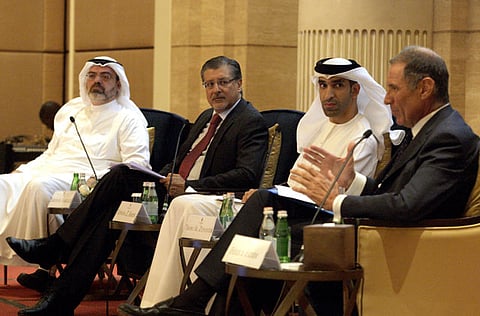With falling costs, renewable energy transforms world
Renewable energy can cut 7m annual deaths due to air pollution

Abu Dhabi: Seven million people die due to air pollution across the world every year but deployment of renewable energy can check this trend, senior officials said in the capital.
Apart from offering environmental and health benefits, renewable energy with its decreasing costs has started playing a larger positive role in socio-economic sectors. Renewable energy provides energy access to millions of people living in energy poverty, creates millions of jobs every year, and contributes significantly to the national income of many countries, they said.
“Today, renewable energy outcompetes coal in South Africa and shale gas in the world market. They [renewable energy sources] are overwhelmingly cheaper than any other energy source,” Dr Sultan Ahmad Al Jaber, Minister of State and Chairman of Masdar, Abu Dhabi Future Energy Company, said.
Renewables have become the economic choice of even some oil-exporting countries. “Here in the UAE solar PV [photovoltaic] cost was
$5 (Dh18.36) per watt in 2008; but today it costs less than $1.5 per watt,” Al Jaber said.
He said renewable energy makes good economic sense now.
Al Jaber was addressing a ceremony to launch the first annual institutional publication of the International Renewable Energy Agency (Irena) on Sunday evening in the presence of Suhail Al Mazroui, UAE Minister of Energy, and other high-level officials from the public and private sector.
The Abu Dhabi-based intergovernmental agency’s publication titled REthinking Energy is part of its efforts to promote widespread adoption and sustainable use of all forms of renewable energy.
The first edition of REthinking Energy focuses on the global power sector and how technological advances, economic growth and climate change are transforming it.
The report urges speeding up the adoption of renewable energy technologies as the most feasible route to reduce carbon emissions and avoid catastrophic climate change.
Adnan Z. Ameen, director-general of Irena, said over the past 40 years, the world’s population grew from 4 billion to 7 billion. An increasing proportion is middle class and living in cities. During the same period, electricity generation grew by more than 250 per cent.
In 2030 there will be more than 8 billion people, with 5 billion in urban conglomerations. World electricity generation is forecast to grow by 70 per cent in 2030.
Historically, as energy consumption grows, so do carbon dioxide emissions. The burning of fossil fuels to generate electricity accounts for more than 40 per cent of man-made carbon dioxide (CO2) emissions today.
The emissions from solar, wind, nuclear, hydroelectric and geothermal sources of energy are, across their lifetime, 10 to 120 times less g than the cleanest fossil fuel (natural gas) and up to 250 times lower than coal.
About the falling costs, he said solar photovoltaic costs alone fell by two-thirds between the end of 2009 and 2013: a speed of change comparable to that seen in the IT revolution. In Denmark, wind recently became the cheapest energy source of all, beating out even coal. In Germany, almost half of all renewable generation is now owned by households and farmers, marking a profound shift in control, Ameen said.



